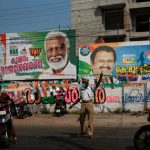Vladimir Putin has signed a law allowing him to run in two more elections, potentially keeping him in power until 2036.
The Russian president signed the legislation after a year-long process to “reset” the presidential terms by rewriting the constitution.
The majority of Russians voted to approve Mr Putin’s amendments to the country’s constitution last year, allowing the 68-year-old to change the presidential term limits.
Subscribe to the Daily podcast on Apple Podcasts, Google Podcasts, Spotify, Spreaker
The new law will allow Mr Putin to run in two more elections after the Kremlin-controlled legislature rubber-stamped the changes on Easter Monday.
The next election will be in 2024 and Mr Putin said he would decide later whether to run after the end of his current term.
Mr Putin has been president for more than two decades, longer than any other Kremlin leader since Soviet dictator Josef Stalin.
He argued that resetting the term count was necessary to keep his lieutenants focused on their work instead of “darting their eyes in search for possible successors”.
The constitutional amendments also outlawed same-sex marriage, while also giving Mr Putin and former president Dmitry Medvedev lifetime immunity from prosecution.
Please use Chrome browser for a more accessible video player
Nearly 78% of voters approved the constitutional changes in July 2020, despite protests in Moscow and St Petersburg.
The opposition criticised the constitutional vote, arguing that it was tarnished by widespread reports of pressure on voters and other irregularities, as well as a lack of transparency and hurdles hindering independent monitoring.
In the months since the vote, Russia has imprisoned the country’s most prominent opposition figure, Alexei Navalny.
Mr Navalny was arrested in January after returning from Germany, where he spent five months recovering from a nerve agent poisoning.
He has blamed the Kremlin for targeting him with novichok – an allegation that Russian authorities reject.
In February, Mr Navalny was sentenced to two and a half years in prison for violating the terms of his probation while recovering in Germany.
The sentence stems from a 2014 embezzlement conviction that Mr Navalny has rejected as fabricated – and which the European Court of Human Rights has ruled to be unlawful.
On 31 March Mr Navalny went on a hunger strike protesting the lack of proper medical treatment for his back and leg pain.
Russian police stepped up security at the prison holding the Kremlin critic on Tuesday as his supporters prepared to stage a protest outside the facility to demand authorities give him proper medical care.






















